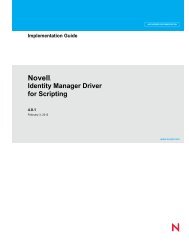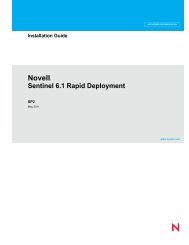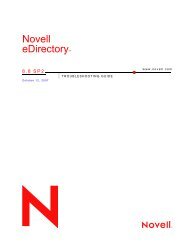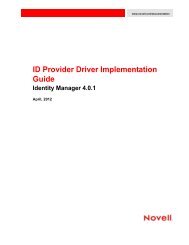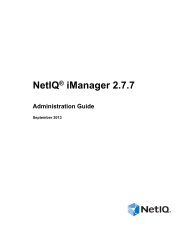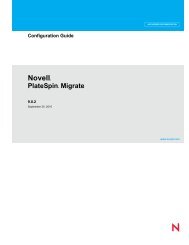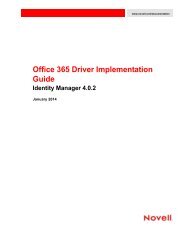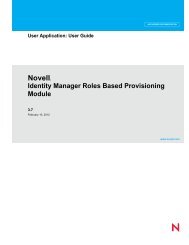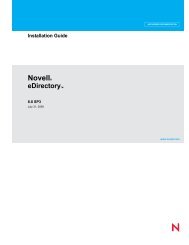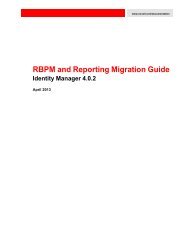Novell LDAP Proxy 1.0 Administration Guide - NetIQ
Novell LDAP Proxy 1.0 Administration Guide - NetIQ
Novell LDAP Proxy 1.0 Administration Guide - NetIQ
You also want an ePaper? Increase the reach of your titles
YUMPU automatically turns print PDFs into web optimized ePapers that Google loves.
A server is marked unavailable or slow based on any of the following:<br />
• The connection attempt returns an error.<br />
• The connection has timed out.<br />
• The directory server is unhealthy.<br />
• The proxy receives a connection error on an active connection while sending a request.<br />
When a back-end server is unavailable, <strong>LDAP</strong> <strong>Proxy</strong> switches active connections to an<br />
available back-end server in the server group. Requests that are partially serviced are also<br />
routed to a new back-end server, and an <strong>LDAP</strong> busy result code (51) is sent for the partially<br />
serviced requests.<br />
• Identity-based Policies: <strong>LDAP</strong> <strong>Proxy</strong> provides a simple but powerful set of policies that<br />
allows you to implement a greater level of access control over incoming <strong>LDAP</strong> requests.<br />
• The Network Restriction policy allows you to configure the proxy server as a firewall.<br />
You can use this policy to restrict requests based on clients’ network parameters, such as<br />
IP address and network address.<br />
Figure 1-2 <strong>LDAP</strong> <strong>Proxy</strong> as a Directory Firewall<br />
User 1<br />
Request<br />
User 1<br />
Request<br />
Client 1<br />
Denied<br />
Request<br />
Directory<br />
Server 1<br />
Client 2<br />
<strong>LDAP</strong><br />
<strong>Proxy</strong><br />
User 3<br />
Request<br />
User 3<br />
Request<br />
Client 3<br />
Directory<br />
Server 2<br />
• The Connection Route policy enables you to route an incoming connection to an<br />
appropriate back-end server group. It also determines the identity of an incoming<br />
connection and applies required policies before forwarding the processed connection to<br />
the associated server group.<br />
• The Search Restriction policy facilitates re-encoding of incoming search requests. This<br />
helps to implement actions such as hiding containers, restricting search attributes, and<br />
restricting the search filter (such as CN=*).<br />
Overview of <strong>Novell</strong> <strong>LDAP</strong> <strong>Proxy</strong> 11




